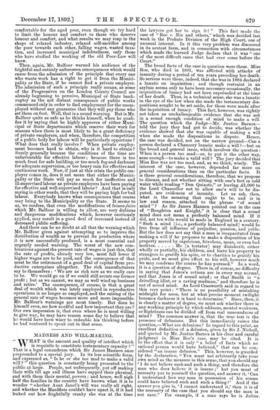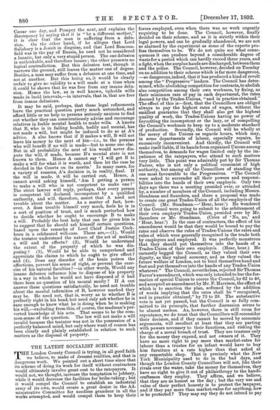MADNESS AND WILL-MAKING.
"THAT is the amount and quality of intellect which is requisite to constitute testamentary capacity ? " That is a legal conundrum which Sir James Hannen once propounded to a special jury. In its less scientific form, and expressed as, " Is he or she too mad to make a valid will ? ' this question is constantly being presented to the public at large. People, not unfrequently, put off making their wills till age and illness have sapped their physical, and with them their mental, powers ; and hence, well nigh half the families in the country have known what it is to wonder " whether Aunt Janet's will was really all right, and whether the Hardfists couldn't have upset it, if it had leaked out how frightfully cranky she was at the time the lawyers got her to sign it ? " This fact made the case of "Roe v. Nix and others," which was decided last week in the Probate Division of the High Court, one of unusual interest. In it this very problem was discussed in its acutest form, and in connection with circumstances which made the learned Judge declare that it was " one of the most difficult cases that had ever come before the Court."
The broad facts of the case in question were these. Miss Roe, who died in 1891, was afflicted with attacks of insanity during a period of ten years preceding her death. So serious were these, indeed, that she was in 1884 declared a lunatic on inquisition ; and though restraint in an asylum seems only to have been necessary occasionally, the inquisition of lunacy had not been superseded at the time of her death. Thus, in a technical sense, she was a lunatic in the eye of the law when she made the testamentary dis- positions sought to be set aside, for these were made after the inquisition of lunacy. This fact, however, was rightly not taken as unchallengeable evidence that she was not in a sound enough condition of mind to make a will.
The question which the Judge—Mr. Justice Barnes— told the jury they had got to decide, was whether the evidence showed that she was capable of making a will when she made the dispositions in dispute. Hence, the case was decided, not on the narrow ground—Can a person declared a Chancery lunatic make a will ?—but on the broad and general issue, which involves the question : When is a person too mad—or, to put it the other way, sane enough—to make a valid will ? The jury decided that Miss Roe was not too mad, and, as we think, wisely. The interest of the case, however, depended far more on general considerations than on the particular facts. It is these general considerations, therefore, that we propose to discuss, and not whether sitting with one's feet in cold water while reading " Don Quixote," or leaving £1,000 to - the Lord Chancellor not to allow one's will' to be dis- puted, are evidences of insanity. Let us ask, then, what is the meaning that ought to be, and is in law and reason, attached to the phrase " of sound mind " ? As Sir James Hannen pointed out in the case of " Boughton and Knight," it is clear that a sound mind does not mean a perfectly balanced mind. If it did, not ten wills would be made in England in a century. " Such a mind [i.e., a perfectly balanced mind] would be free from all influence of prejudice, passion, and pride. But the law does not say that a man is incapacitated from making a will if he proposes to make a disposition of his property moved by capricious, frivolous, mean, or even bad motives He [a testator] may disinherit, either wholly or partially, his children, and leave his property to strangers to gratify his spite, or to charities to gratify his pride, and we must give effect to his will, however much we may condemn the course he has pursued." In a word, it is a question of degree. There is, of course, no difficulty in saying that Jones's actions are in every way normal, and that Jones is of sound mind ; or that Smith is "a drivelling idiot, or a raving madman," and therefore he is not of sound mind. As Lord Cranworth said in regard to this very point : " There is no possibility of mistaking midnight for noon, but at what precise moment twilight becomes darkness it is hard to determine." Since, then, it is clearly a matter of degree, we must ask whether there is any working principle by which oddness, mental weakness, or flightiness can be divided off from real unsoundness of mind ? The common answer is, that the true test is the presence of delusions. But this immediately raises the question,—What are delusions? In regard to this point, an excellent definition of a delusion, given by Sir J. Nicholl, and quoted by Mr. Justice Barnes in his clear and careful judgment in Miss Roe's case, may be cited. It is to the effect that it is only " a belief of facts which no rational person would have believed," that can be con- sidered "an insane delusion." This, however, is guarded ' by the declaration, " You must not arbitrarily take your own mind as the measure in this sense, that you should say '1 do not believe such and such a thing, and therefore the man who does believe it is insane ;' but you must of necessity put to yourself the question, and answer it, Can I understand how any man in possession of his senses could have believed such and such a thing?' And if the answer you give is, I cannot understand it,' then it is of the necessity of the ease that you should say the man is not sane." For example, if a man says he is Julius, It may be who will benefit if no will is made—but to some one else.
probability But in all the next of kin would never dis- pute the will, if made, because B's mental state is not known to them. Hence A cannot say I will get B to patience of the ratepayers, who attend to such matters make a will for what it is worth, and then let the case be decided in the Courts on its merits.' In many cases, for a variety of reasons, A's decision is, in reality, final. If authority, but among all carried out. Hen be is made, it will Hence, the will ll , A one most favourable to the Progressives. "The Council who is not competent to make one ? ' cannot avoid asking himself, Am I getting a person to make a will bilities into the hands of their own employes. Only two The strict lawyer will reply, perhaps, that every person days ago there was a meeting presided over, or attended by, a number of members of the Council. including Messrs. is competent till declared incompetent by a qualified Steadman and Saunders, and there a proposal was made authority, and will, therefore, assert that A need not trouble about the matter. As a matter of fact, how- to create one great Trades-Union of all the employes of the ever, A does trouble himself very much, feels he is in Council. (Mr. Steadman. 'Hear, hear.') He wondered if a sort of position of trust, and is much perturbed how the Council were going to submit to the arbitrament of their own employes' Trades-Union, presided over by Mr. to decide whether he ought to encourage B to make a will. Probably the best help that can be given him is Saunders or Mr. Steadman. (Cries of 'No, no,' and to suggest that he should ask himself certain questions, Hear, hear.') In the case of contractors, the effect of his Cock- upon the remarks of Lord Chief Justice amendment would be that they would be bound to pay the burn in a celebrated will-case. These are,—(1), Would the testator understand the nature of the act of making rules of which were generally recognised in the trade both a will and its effects.? (2), Would he understand by employers and employed. It was perfectly monstrous able to comprehend and the extent of the property of which he was die- posing ? (3), Would he be Trades-Union of their own employes. (Hear, hear.) He appreciate the claims to which he ought to give effect ? earnestly begged the Council, as they valued their own and (4), Does any disorder of the brain poison the dignity, as they valued economy, and as they valued the -vise of pervert his sense of right, or prevent the exer- fise of his natural faculties ?—in other words, Would any foot and put themselves into the hands of any Trades-Union him to dispose of his property insane delusion influence whatever." The Council, nevertheless, rejected Sir Thomas Farrer's amendment, which was only intended to bar the for- in a way in which he would not have disposed of it had there been no question of his mental sanity ? If A can oration of special Unions to coerce the Council, by 62 to 46, and accepted an amendment by M r. F. Harrison, the effect of answer these questions satisfactorily, he need not trouble about the mental infirmities of B, however marked they which is to sanction the plan, softened by the addition may be. He need not, that is, worry as to whether B is of words implying that the rates shall be "recognised, perfectly right in his head, but need only ask whether he is and in practice obtained," by 73 to 29. The substantive rn- sane enough to know what he is doing when he is making vote is not yet passed, but the Council is so fully co his will,—excluding from this, of course, the madman's per- mitted to its principle, that further discussion seems to verted knowledge of his acts. That seems to be the corn- be almost useless. As, however, there is still room for mon-sense of the question. The law will not make a will repentance, we do trust that the Councillors will reconsider invalid because the testator was not in the possession of a their decision, and if they cannot be moved by economic perfectly balanced mind, but only where want of reason has arguments, will recollect at least that they are parting been clearly and plainly established in relation to such with powers necessary to their functions, and risking the matters as the disposal of property. charge of a moral breach of trust. They are trustees only







































 Previous page
Previous page